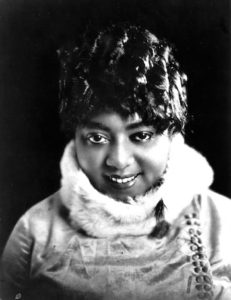
Mamie Smith
Mamie Smith, a Black singer, was born on this date in 1883 in Cincinnati, OH.
Mamie Gardener began her career in show business as a dancer with the Four Dancing Mitchells. By 1910, Smith was touring the Midwest and East Coast with the Smart Set Company, a Black minstrel troupe. She married singer William “Smitty” Smith in 1912. The couple moved to New York, where she began working as a cabaret dancer, pianist, and singer. Her first significant break came in 1918 when she appeared in Perry Bradford’s musical “Made in Harlem.”
Though technically not a blues performer, Mamie Smith notched her place in American music as the first Black female singer to record a vocal blues. This first recording session was an accident; she was filling in for Sophie Tucker, but the record's success made her a wealthy woman. That recording was “Crazy Blues” (recorded August 10, 1920), which sold a million copies in its first six months and made record labels aware of the huge potential market for “race records.” This paved the way for Bessie Smith (no relation) and other blues and jazz performers. Smith was an entertainer with a powerful, penetrating, feminine voice and belting vaudeville qualities, which added to blues inflections.
In the 1930s, Smith began touring and recording with a band called the Jazz Hounds, which featured notable jazz musicians such as Coleman Hawkins, Bubber Miley, and Johnny Dunn. She toured with the bands of Andy Kirk and Fats Pichon. She appeared in some films, including “Paradise in Harlem,” later in her life (1939). She recorded several songs for OKeh Records, including “My Sportin' Man.” Mamie Smith died in New York, NY, on August 16, 1946.
Nothing but the Blues the Music and the Musicians
Edited by Lawrence Cohn
Copyright 1993 Abbeville Publishing Group, New York
ISBN 1-55859-271-7